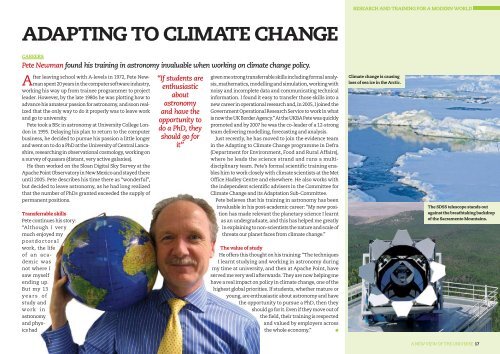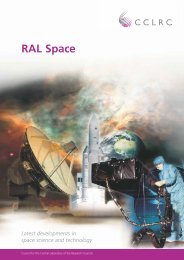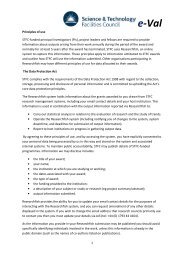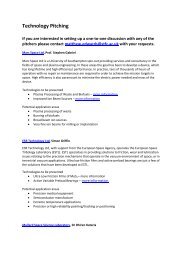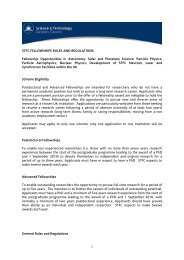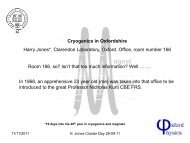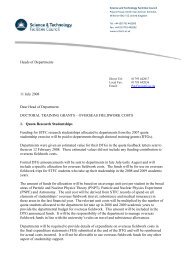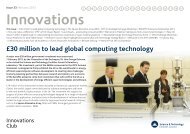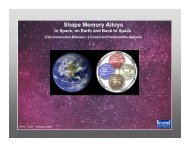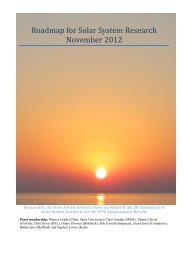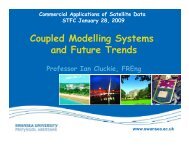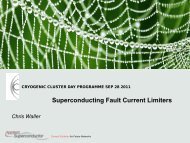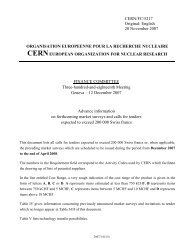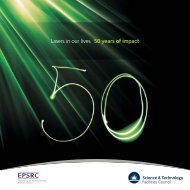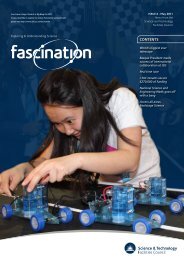A new view of the Universe - Science & Technology Facilities Council
A new view of the Universe - Science & Technology Facilities Council
A new view of the Universe - Science & Technology Facilities Council
Create successful ePaper yourself
Turn your PDF publications into a flip-book with our unique Google optimized e-Paper software.
RESEARCH AND TRAINING FOR A MODERN WORLD<br />
ADAPTING TO CLIMATE CHANGE<br />
CAREERS<br />
Pete Newman found his training in astronomy invaluable when working on climate change policy.<br />
After leaving school with A-levels in 1972, Pete Newman<br />
spent 20 years in <strong>the</strong> computer s<strong>of</strong>tware industry,<br />
working his way up from trainee programmer to project<br />
leader. However, by <strong>the</strong> late 1980s he was plotting how to<br />
advance his amateur passion for astronomy, and soon realized<br />
that <strong>the</strong> only way to do it properly was to leave work<br />
and go to university.<br />
Pete took a BSc in astronomy at University College London<br />
in 1995. Delaying his plan to return to <strong>the</strong> computer<br />
business, he decided to pursue his passion a little longer<br />
and went on to do a PhD at <strong>the</strong> University <strong>of</strong> Central Lancashire,<br />
researching in observational cosmology, working on<br />
a survey <strong>of</strong> quasars (distant, very active galaxies).<br />
He <strong>the</strong>n worked on <strong>the</strong> Sloan Digital Sky Survey at <strong>the</strong><br />
Apache Point Observatory in New Mexico and stayed <strong>the</strong>re<br />
until 2005. Pete describes his time <strong>the</strong>re as “wonderful”,<br />
but decided to leave astronomy, as he had long realized<br />
that <strong>the</strong> number <strong>of</strong> PhDs granted exceeded <strong>the</strong> supply <strong>of</strong><br />
permanent positions.<br />
Transferrable skills<br />
Pete continues his story:<br />
“Although I very<br />
much enjoyed my<br />
postdoctoral<br />
work, <strong>the</strong> life<br />
<strong>of</strong> an academic<br />
was<br />
not where I<br />
saw myself<br />
ending up.<br />
But my 13<br />
y ea r s <strong>of</strong><br />
study and<br />
work i n<br />
astronomy<br />
and physics<br />
had<br />
“If students are<br />
enthusiastic<br />
about<br />
astronomy<br />
and have <strong>the</strong><br />
opportunity to<br />
do a PhD, <strong>the</strong>y<br />
should go for<br />
it”<br />
given me strong transferrable skills including formal analysis,<br />
ma<strong>the</strong>matics, modelling and simulation, working with<br />
noisy and incomplete data and communicating technical<br />
information. I found it easy to transfer those skills into a<br />
<strong>new</strong> career in operational research and, in 2005, I joined <strong>the</strong><br />
Government Operational Research Service to work in what<br />
is now <strong>the</strong> UK Border Agency.” At <strong>the</strong> UKBA Pete was quickly<br />
promoted and by 2007 he was <strong>the</strong> co-leader <strong>of</strong> a 12-strong<br />
team delivering modelling, forecasting and analysis.<br />
Just recently, he has moved to join <strong>the</strong> evidence team<br />
in <strong>the</strong> Adapting to Climate Change programme in Defra<br />
(Department for Environment, Food and Rural Affairs),<br />
where he leads <strong>the</strong> science strand and runs a multidisciplinary<br />
team. Pete’s formal scientific training enables<br />
him to work closely with climate scientists at <strong>the</strong> Met<br />
Office Hadley Centre and elsewhere. He also works with<br />
<strong>the</strong> independent scientific advisers in <strong>the</strong> Committee for<br />
Climate Change and its Adaptation Sub-Committee.<br />
Pete believes that his training in astronomy has been<br />
invaluable in his post-academic career: “My <strong>new</strong> position<br />
has made relevant <strong>the</strong> planetary science I learnt<br />
as an undergraduate, and this has helped me greatly<br />
in explaining to non-scientists <strong>the</strong> nature and scale <strong>of</strong><br />
threats our planet faces from climate change.”<br />
The value <strong>of</strong> study<br />
He <strong>of</strong>fers this thought on his training: “The techniques<br />
I learnt studying and working in astronomy during<br />
my time at university, and <strong>the</strong>n at Apache Point, have<br />
served me very well afterwards. They are now helping me<br />
have a real impact on policy in climate change, one <strong>of</strong> <strong>the</strong><br />
highest global priorities. If students, whe<strong>the</strong>r mature or<br />
young, are enthusiastic about astronomy and have<br />
<strong>the</strong> opportunity to pursue a PhD, <strong>the</strong>n <strong>the</strong>y<br />
should go for it. Even if <strong>the</strong>y move out <strong>of</strong><br />
<strong>the</strong> field, <strong>the</strong>ir training is respected<br />
and valued by employers across<br />
<strong>the</strong> whole economy.”<br />
■<br />
Climate change is causing<br />
loss <strong>of</strong> sea ice in <strong>the</strong> Arctic.<br />
The SDSS telescope stands out<br />
against <strong>the</strong> breathtaking backdrop<br />
<strong>of</strong> <strong>the</strong> Sacramento Mountains.<br />
A NEW VIEW OF THE UNIVERSE 17


